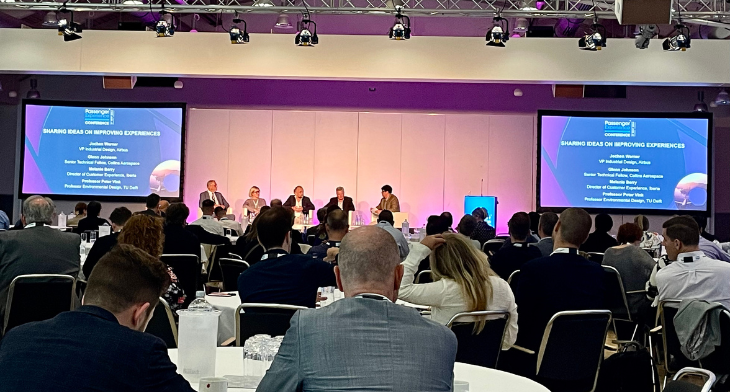
Inflight Editor Satu Dahl reports from the Passenger Experience Conference (PEC), which took place at the Hamburg Messe on Monday 27 May ahead of the Aircraft Interiors Expo (AIX) and the World Travel Catering & Onboard Services Expo (WTCE).
The Passenger Experience Conference (PEC) once again featured fascinating insight, reuniting airlines, aircraft manufacturers, cabin suppliers and industry experts to discuss the hot topics influencing the airline passenger experience.
The event featured panellists and speakers from airlines and companies such as Iberia, Avianca, Collins Aerospace, Airbus, Boeing and much more. Polly Magraw, Event Director, Aircraft Interiors Expo and World Travel Catering and Onboard Services commented: “This year’s approach will encourage delegates to contribute to the engaging discussions to transform today’s challenges into tomorrow’s business opportunities.”
Moderated by Seth Miller of PaxEx.Aero, the conference’s first plenary session focused on future travel experiences. Melanie Berry, Director of Customer Experience at Iberia, Glenn Johnson FRAeS, Senior Technical Fellow at Collins Aerospace, Jochen Werner, Vice President Airbus Industrial Design at Airbus Operations and Professor Peter Vink, Professor Environmental Design at Delft University of Technology discussed how future technologies will deliver a completely different and more personalised flight experience.
The thought-provoking discussion points varied from allocating staggered seats based on passengers’ previous preferences and emotional experiences on previous flights to how vibration technology, along with light and temperature, will help people get to sleep and wake up feeling fresher.
Following this, there were three streams at the event. The Removing the Road Blocks to Accessible Travel session focused on how the sector is embarking on a new path to improve the travel experience for passengers with disabilities. Representatives from Boeing introduced new ways of thinking about accessibility and the panel formed of William Harkness, Head of Engineering – Accessibility at Boeing Commercial Airplanes, Eric Ezell, Head of Cabin & Cargo Innovation at Airbus, Brenna Wynhof, Regional Director, Cabin Marketing at Boeing Commercial Airplanes Engineering and Maria Paula Pineda, Accessibility Strategy Manager at Avianca discussed their methods and efforts to work with, design for, and enable a dignified travel journey for people with disabilities.
‘Maximising Connections – Harnessing the Power of Data’ session focused on how we will consider a future in which data is harnessed to ease the journey for travellers as well as creating opportunities for airlines and their partners.
The ‘Sustainable and Cost-Effective Strategies’ session looked at nurturing new ideas that will deliver systemic change and require us to to consider today’s challenges from new perspective, also examining how airlines and their industry partners will find efficiencies and reduce costly wastage in the future.
The afternoon’s future-focused topics looked at how, with new travel systems on the near horizon, tomorrow’s journey options will be more competitive and complex to navigate and how air travel should fit within a future collaborative and connected ecosystem. Other hot topics discussed in the afternoon’s sessions included sustainable technologies such as electric vertical take-off and landing (EVTOL) aircraft and new methodologies, processes and thinking to reduce the environment footprint of the cabin.
When it comes to artificial intelligence (AI), the discussions explored how technologies and AI tools offer the potential to revolutionise passenger experiences across the travel journey.
‘Mitigating the Uncertainties of the Future In-Cabin Experience’ session looked at how cabin innovation is a process of managing partnerships, competing priorities and sometimes setbacks, and how we can evolve our approach to ensure future cabin initiatives deliver for all stakeholders.
